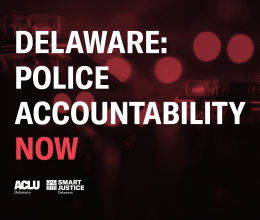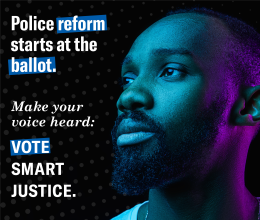PRESS RELEASE: Wednesday, April 21, 2021
CONTACT: Morgan Keller, Communications Director, ACLU-DE, [email protected]
Delaware: Police Accountability NOW Campaign Launches a Day After Guilty Verdict in Chauvin Murder Trial
WILMINGTON—At a press conference today, the ACLU of Delaware, NAACP of Delaware, Network Delaware, Metropolitan Wilmington Urban League’s Building People Power Campaign, Not Just Another Protest, and the Delaware Campaign for Smart Justice Policing Workgroup launched Delaware: Police Accountability NOW, a new campaign aimed at increasing police accountability and transparency.
On April 21, a Minnesota police officer, Derek Chauvin, was held accountable for the murder of George Floyd — an outcome that’s extremely rare in cases of police misconduct. So rare, in fact, that Delaware has never seen a similar conviction, despite the fact that more than 31 Delawareans have been killed by police in our state since 2005.
“Chauvin’s conviction was an important step forward in police accountability, but it doesn’t bring justice to Mr. Floyd or any of the other lives lost at the hands of police. To realize justice, we must radically change policing to increase accountability and transparency and create policies that combat racist police practices.” said Haneef Salaam, manager of ACLU of Delaware’s Campaign for Smart Justice.
For decades, Delaware police officers have enjoyed special layers of protection in incidents of police misconduct through laws such as the Law Enforcement Officer’s Bill of Rights (LEOBOR), that make transparency and accountability difficult in police misconduct cases.
In 2020, in response to nationwide and local protests calling for immediate and meaningful police reform after the murders of George Floyd and Breonna Taylor, the Delaware Legislative Black Caucus formed the Law Enforcement Accountability Task Force (LEATF). The LEATF was tasked with recommending reforms that the General Assembly can make to create real, actionable changes to the law enforcement system in Delaware. After nearly a year, no official recommendations have been made, no police reform legislation has been introduced, and police misconduct has continued unchecked throughout the state, including the killing of Lymond Moses in Wilmington this January.
Under current laws in Delaware, the public is not guaranteed any transparency in a police-involved incident. In fact, Delaware’s LEOBOR makes public access to police investigations nearly impossible. As a result, the public has no insight on why an incident occurred, what could have been done to prevent it, or what disciplinary actions, if any, happened as a result of the investigations. Delaware’s LEOBOR statute is the worst in the nation for transparency, making the state a leader in police secrecy.
LEOBOR also prevents community-led groups, such as Civilian Complaint Review Boards (CCRB) from effectively reviewing, investigating, and disciplining officers in misconduct cases. Coupled with Delaware’s extraordinarily secret laws, this creates a culture of distrust between police and community members.
Other laws that allow excessive use of force and body-worn camera footage to remain held from the public are additional tools that actively fuel further incidents of police misconduct — and grow the deep divide of trust between communities in Delaware and the officers who are sworn to serve and protect them.
During the press conference, Keandra McDole, sister of Jeremy McDole, talked about the continued trauma that she and her family still endure over five years after Wilmington Police officers killed her brother. “And still to this day, we don’t even know what the officers look like who executed my brother,” Keandra said. “Me and my family walk around terrified every day because we don’t know if we have direct contact with these officers.”
The Delaware: Police Accountability NOW campaign will focus on passing four main reforms before this year’s legislative session ends:
- Revise LEOBOR to make police disciplinary records and use of force reports public record.
- Amend LEOBOR to allow civilian review boards that can review, investigate, and discipline officers in misconduct cases to be established in cities across Delaware.
- Revise the standards and practices for use of force so that officers can be held accountable when they engage in unconstitutional use of force.
- Implement body-worn cameras, require them to be turned on during all police and community interactions, and make that footage public.




